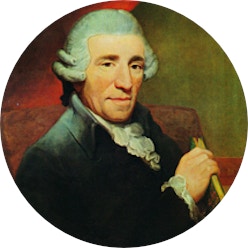
Joseph Haydn
31 de marzo de 1732 - Rohrau (Austria) — 31 de mayo de 1809 - Viena (Austria)
Acerca de
Joseph Haydn, the master of classicism
Joseph Haydn started out as a child with a miraculous voice. It was said that he nearly suffered the fate of the castrati at his choir school. His gifts and encounter with the great Porpora brought him into the employment of the rich Esterhazy family in 1761. The capricious, music-amateur prince then dominated his existence ordering an incredible amount of works. The prolific composer produced symphonies, operas, chamber music, sonatas and more.
Joseph Haydn’s music blossomed within the classical movement of which he was the greatest representative. Abandoning bass continuo and strict counterpoint to benefit a more balanced form carried by gracious and natural singing, made Haydn the most modern composer of his era. Venerated by Wolfgang Amadeus Mozart, they met in 1785 and formed a friendship. The extraordinary, young composer was to call him “Papa Haydn”. Haydn was a discreet, rather sombre, sometimes funny man who seldom travelled apart from the three years spent in London where he wrote twelve symphonies, the apogee of his art.
The Haydn of the Creation
After his stay in London, possibly following Handel’s example, Joseph Haydn wrote numerous, intensely spiritual oratorios. Tired and ill, he composed very little from 1801 onwards. He made a last public appearance in 1808 during a concert of the Creation conducted by Salieri. It was a resounding success and Ludwig van Beethoven ran after him to kiss his hands. He left an immense work comprising both nobility and surprise. His sense of humour, musical surprises, perfection and originality made Haydn a master in the greatest sense of the word.

